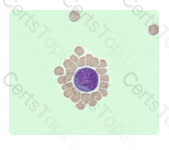Verified By IT Certified Experts
CertsTopics.com Certified Safe Files
Up-To-Date Exam Study Material
99.5% High Success Pass Rate
100% Accurate Answers
Instant Downloads
Exam Questions And Answers PDF
Try Demo Before You Buy






The image shown in this question is depicting a rosette formation. Here the red blood cells are surrounding and adhering to the outside of the white blood cell.

What is the best description of the phenomenon seen in this illustration?
Vitamin K is needed to produce certain coagulation factors, in particular factors II, VII, IX, and X. Deficiencies in these factors can lead to increased clotting times and can cause hemorrhagic disease.
A deficiency in which of these vitamins leads to increased clotting time and may result in hemorrhagic disease?
Insulin is the hormone that is mainly responsible for the entry of glucose into the cell for energy production
Glucagon and epinephrine promote glycogenolysis, conversion of glycogen to glucose, which increases plasma glucose. Cortisol, along with glucagon, increases gluconeogenesis, formation of glucose from noncarbohydrates, which also raises plasma glucose concentration.
Chemistry
Which of the following hormones is mainly responsible for the entry of glucose into the cell for energy production?